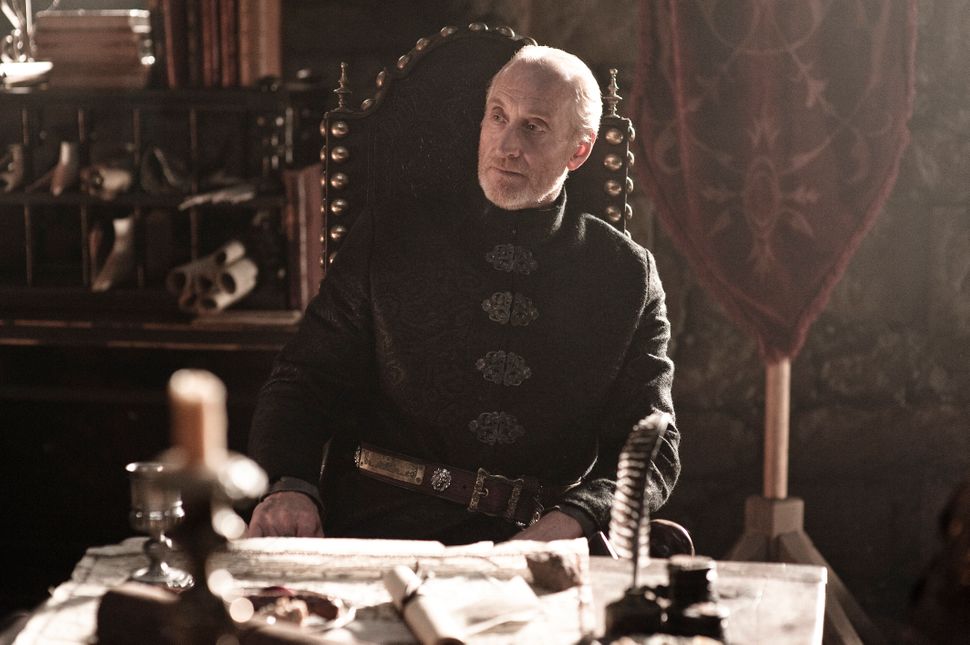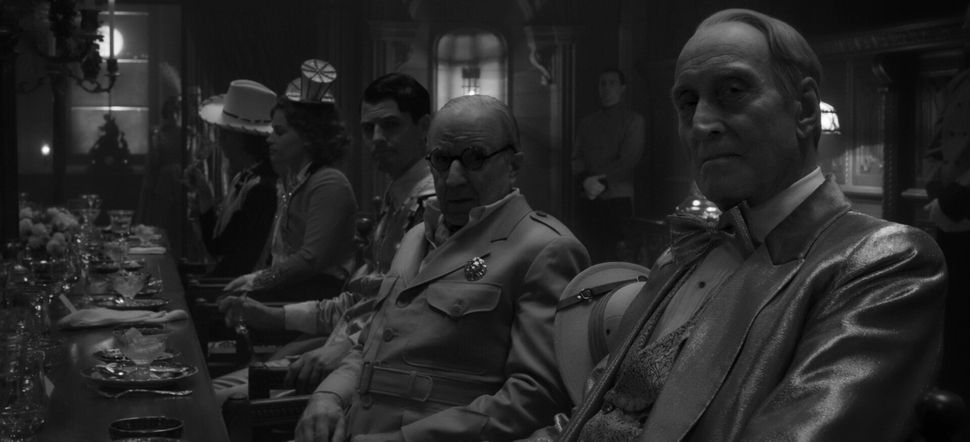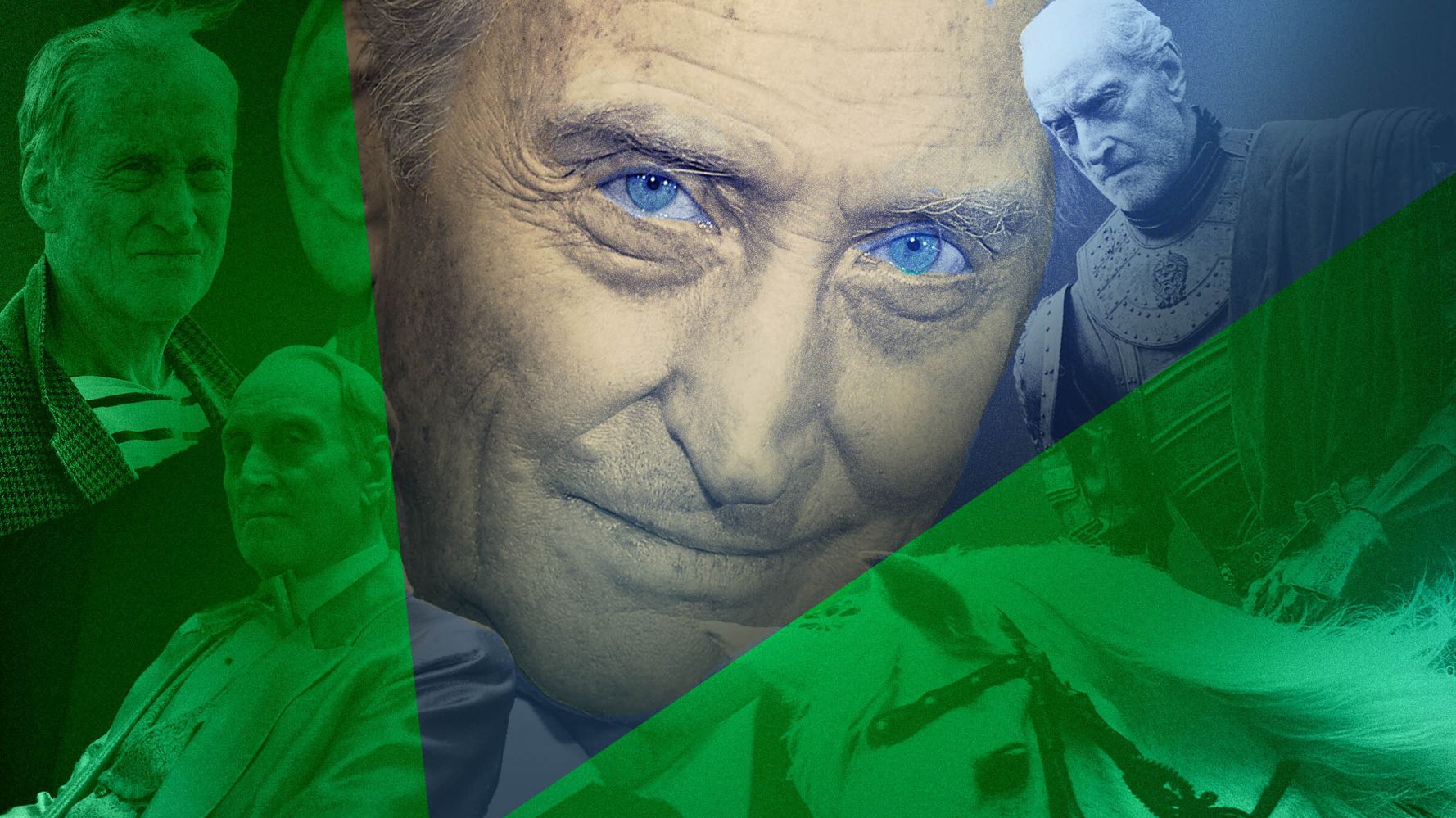[ad_1]
Well before his best-known character Tywin Lannister was shot on the loo at the end of “Game of Thrones” Season 4, Charles Dance was contemplating his career. Sure, he was getting older, but the British actor knew there were plenty of substantial roles yet to come his way, despite the film industry’s long-standing focus on youth and beauty.
People may age, Dance told me last week as he sipped tea and snacked on a cinnamon bun, but they don’t ― or rather shouldn’t ― age out of Hollywood.
“If actors retire, there would be nobody to play the old, wrinkly people,” the 74-year-old said with a chuckle.
Dance applauded the late French actor Simone Signoret, whose 1979 autobiography, “Nostalgia Isn’t What It Used To Be,” featured a closeup photo of her face on the cover.
“There were these wonderful lines around her eyes and around the corner of her mouth. She was puffy. But she looked fantastic. On her face was the story of her life,” he recalled. “Our faces, if we let them, get more interesting as we get older.”
In his 60s, Dance was cast as the ruthless head of House Lannister in “Game of Thrones,” which became HBO’s most-watched series over its eight-season run. The highly respected stage and screen actor’s memorable performance as Tywin made him a household name and was followed by other successful projects, including “The Imitation Game” (2014), “Ghostbusters” (2016), “Godzilla: King of Monsters” (2019), and most recently “The Crown” and David Fincher’s upcoming buzzed-about film “Mank.”
Dance ― who, I can assure you, is much more charming over the phone than Tywin might be if he were pushing his latest project ― said, “I’m very lucky, especially at the moment when the world’s turned upside down and people from all walks of life are struggling in one way or another.”

When Dance and I spoke over the phone, it was a “wintery, blustery” day in London and he and his countrymen were back in quarantine after Prime Minister Boris Johnson issued a second national lockdown amid spikes in COVID-19 cases. Dance is tested frequently for the coronavirus while he’s currently in production on a top-secret Netflix project, although he notes that isn’t the case for his fellow citizens.
“We claim to have this world-beating test and trace system in this country. Well, it’s a shambles,” he said. “People maybe have to drive 100 miles to just test and wait for five days before they get a result and it’s chaotic. Whereas, if you’re prepared to pay for it, you can have a rapid test and get your result in an hour. That’s how we are able in this industry to keep going.”
Dance said the Netflix set observes all the rules and regulations, including mask-wearing and social distancing. “We have lunches prepacked and not very nice, usually,” he said, laughing. “But the job remains the same. We just have hurdles to jump every day.”
Dance is an expert hurdler after 50 years in the entertainment business. He began as a member of the Royal Shakespeare Company in the 1970s before getting his big break as Guy Perron in the 1984 television series “The Jewel in the Crown.” Although he played James Bond creator Ian Fleming in 1989’s “Goldeneye,” he turned down the opportunity to screen test for Fleming’s famous character years prior. Dance said his agent urged him to stay out of the fold.
“In hindsight, she was probably right because I think I would have blown it,” he said. “I didn’t have nearly enough experience to go into a franchise like that and suck it up. That would have really killed my career.”
After bidding adieu to 007, Dance gained additional recognition in miniseries like “The Phantom of the Opera” (1990), “Rebecca” (1997) and the BBC’s “Bleak House,” for which he was nominated for an Emmy for Lead Actor in a Limited Series or Movie in 2006. He was never individually nominated for “Thrones,” but received Emmy nods for his narration work on National Geographic’s “Savage Kingdom.”
Of awards, Dance said, “Well, you can’t win ’em all.”

He is interested, however, to see what accolades come for “Mank,” Fincher’s ambitious new movie in which Dance stars as William Randolph Hearst, newspaper mogul and the real-life inspiration behind “Citizen Kane.”
“Mank” is a dense black-and-white biopic that reevaluates 1930s Hollywood by detailing the working relationship between “Citizen Kane” actor-director Orson Welles (Tom Burke) and alcoholic screenwriter Herman J. Mankiewicz (Gary Oldman). Fincher’s late father Jack wrote the script, which was first floated around in 1997 before the father-son duo decided to shelve it. His father died of cancer in 2003, but Fincher eventually found an opening with Netflix ― which houses his crime series “Mindhunter” ― to make the movie the way they envisioned it.
“Because of the opinion I have about Fincher, which is basically I think he’s a genius, I just have this feeling all the time that the end result is going to be a really good movie,” Dance said. “I did his first film years ago, which is ‘Alien 3,’ and I thought at the time, ‘Well, this guy’s clever.’”
“Mank” is only his second project with Fincher, but Dance confirmed the 58-year-old director’s intense working method hasn’t changed much since 1992.
“He has a reputation for being demanding,” Dance said. “He goes through a lot of takes and actors moan a bit about that, but it’s not a very deep moan. With success comes a degree of power, so he’s able to put his foot down and basically tell people to ‘fuck off’ and ‘this is what I’m gonna do and if you don’t like it, tough shit.’ Forgive my language.”
“He’s a film animal from the top of his head to the soles of his feet,” the actor added. “He is a perfectionist and he will strive for it, no matter how long it takes.”
Dance appreciates that mindset, even if it’s hard to keep energy levels up after countless calls of “action” and “cut.” For a particular party scene in “Mank,” he said he was impressed by Oldman’s stamina and commitment to his character as Oldman brought new vigor take after take after take.
“We were pretty close to 50 takes,” Dance remembered. “That scene is one long monologue with Mankiewicz vomiting halfway through. And David was covering that scene like he’s covered all the scenes, with four cameras.”
Dance said composition is what the director is focused on. It’s only after he is satisfied with that element that he’ll turn his attention to the actors’ performances. Fincher wants his full artistic vision realized, from start to finish, while Netflix, of course, is probably more interested in the economic side of the business and attracting audiences.
“Although it’s quite a while ago, and Hollywood was a different place, the way the industry was run [during the ‘Citizen Kane’ era] is really not that dissimilar to the way it’s being run now, is it?” Dance said. “It’s this continual trying to please all of the people, all the time, while knowing that we can’t.”
I have to say, personally, I was underwhelmed. … I wanted it to go out with a bang.
Charles Dance on the “Game of Thrones” finale
On the note of pleasing people, how does Dance feel about that polarizing eighth and final season of “Game of Thrones”?
“I have to say, personally, I was underwhelmed,” he observed of the show’s lackluster conclusion. “It was decided by committee and I thought, ‘Oh, no, no, no, no, no.’ I wanted it to go out with a bang.”
“Anyway, it’s just nitpicking,” Dance quickly added. “I wouldn’t have continued to watch it if the show hadn’t been good. It raised the bar when it came to television drama.”
“Thrones” surely paved the way for series like Netflix’s royal family saga “The Crown,” which, when it launched in 2016, was reportedly “the most expensive TV show ever made.” Now, budgets are even bigger as premium content continues to shift from cable networks to streaming platforms. That might explain why Dance has primarily worked with Netflix over the last 18 months.
“Television, both physically and metaphorically, was something that you looked down to ― it was this little box that used to sit in the corner of your living room. Film was something that you looked up to, by virtue of the fact that you went into a cinema and there was an enormous screen. Now, of course, the dividing line between television and film has totally blurred,” Dance said. “People can stream a movie into their television, which is as big as the cinema screen, rather than go to the cinema and listen to the noise of others chomping on popcorn. They can watch it in their home whenever they want to see it, rather than the times a distributor says they have to see the film.”
“I think it’s sad, of course, because there’s a community experience of going to the movies that we’re missing out on,” he continued, “but we’re getting close to emulating that [at home].”
For now, Dance ― whose brilliant Lord Mountbatten, aka Uncle Dickie, meets his end on Season 4 of “The Crown” ― is taking advantage of his working relationship with Netflix, which has allowed him the chance to not only make a living but examine his own country’s monarchy.
“I have no idea whether they ever watch it,” he said, laughing, of Queen Elizabeth and company, “but I fear probably not.”
As for the entrance of Diana, Princess of Wales (Emma Corrin) in the new batch of episodes debuting Nov. 15, Dance believes her story gives viewers a glimpse into the never-ending pressure the royals endure.
“There comes a point where I think one has to be kind and leave them alone, you know? Obviously, they have a life of enormous privilege, but I would hate to be a member of that family. You’re in a goldfish bowl, you’re on show, all the time ― it’s much worse than being a movie star.”
Dance gets his fair share of recognition from passersby, although in pandemic times, that in-person attention has certainly waned a bit. For now, he’s focused on his current Netflix project, which he predicts will get people talking, and set to direct his second feature, “The Inn at the Edge of the World,” whenever the world picks up its pace again.
In terms of a role he can sink his teeth into, I did mention that Hollywood is still on the hunt for a new James Bond.
“I’m too old,” he insisted. “Bond has to be 40 or below.”
Calling all HuffPost superfans!
Sign up for membership to become a founding member and help shape HuffPost’s next chapter
[ad_2]
Source link

